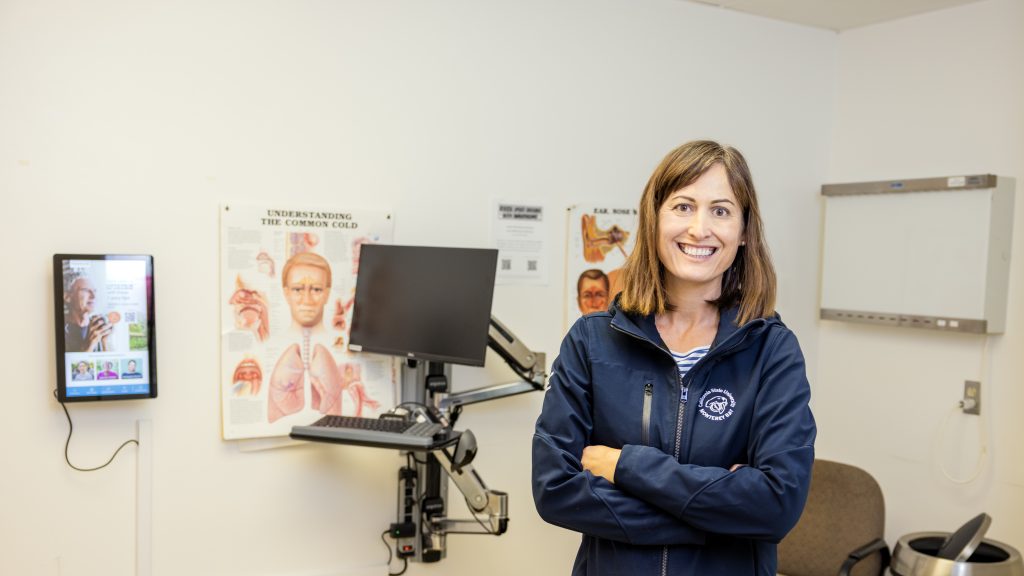Dr. Erikson’s Pre-Conference Workshop for 2023 Symposium will Explore AACN’s Core Spheres
One of the pre-conference workshops at the Shiley Haynes Institute’s upcoming 2023 national symposium will highlight an enhanced role for palliative care, as signaled in the American Association of Colleges of Nursing (AACN)’s latest updating of its “Core Competencies for Professional Nursing Education.” Released in April of 2021, it identifies four “core” spheres of care that may still be unfamiliar to some nursing educators. (See our blog post from last year.)
Alyssa Erikson, RN, PhD, CNE, professor and chair of the Department of Nursing at CSU Monterey Bay, is one of the co-facilitators, along with CSUSM’s Dr. Katie Robinson, of the pre-conference workshop “Palliative Care as a Sphere of Care: Strategies to Align Curriculum with the new AACN Essentials,” at the Shiley Haynes Institute’s 2023 National Symposium for Academic Palliative Care Education and Research, March 1 at the Long Beach, Calif., Hilton Hotel. She says the workshop will highlight the AACN curriculum and its changes, the new place for palliative care in the nursing syllabus, and practical tools for how to incorporate it into existing curricula.
AACN’s four core spheres for professional nursing practice are disease prevention/promotion of health and well-being; chronic disease care; regenerative or restorative care—and hospice/palliative/supportive/end-of-life care. This elevates the care models and settings targeted by the Institute and its primary audience to a more central place in the curriculum.
Teaching Nurses Palliative Care
Dr. Erikson has been a nurse for 22 years. “I received my doctorate in nursing at UCSF and my dissertation research was in the area of pediatric palliative care.” She transitioned into teaching at Monterey Bay 7-1/2 years ago, with a research focus on the study of adult ICU bereavement care. She is also CSUMB’s collaborative Faculty Director for the Shiley Haynes Institute, involved in various joint projects including the development of its palliative care faculty toolkit and participation in cross-campus collaborative research on how to best deliver palliative care education to health professionals in Monterey County.

One of the biggest projects developed in response to the AACN core curriculum is building an online “Palliative Care Faculty Toolkit” for nursing faculty from across the country to use, access and explore activities for teaching palliative care to a variety of students. Not just nurses and social workers, it can also speak to bioethicists, psychologists, philosophers and other professional students, she said. “The toolkit will offer clinical practice guidelines and other resources.”
A larger aim is for all health professional students within participating institutions to achieve a familiarity with and understanding of what palliative care is—and is not. “There are lot of misconceptions, even among health professionals,” Dr. Erikson says. Having nurses feel more comfortable with this subject matter, wherever they are at, is important.
“For the symposium, we are planning our workshop to be very hands-on for nurses to integrate palliative care into curricula with a variety of classroom activities,” Dr. Erikson says. “We invite attendees to bring their existing curricula for us to workshop. We have materials we want to share, and we want to give nurses resources to think about what they can add to what they’re already doing and how to incorporate some of these learning activities for teaching the palliative care curriculum.”
Palliative care is often thought of as appropriate for older people, Dr. Erikson says. “In reality, it has its place in every health care specialty, all the way back to maternity care. Palliative care is relevant whether or not the patient has a life-threatening illness. It’s not just about older adults. It’s relevant even within our own personal worlds, our families and our own private lives, and in the education we share in our communities, churches, coffeehouses and supermarkets,” she says.
“But we’re saying you don’t have to reinvent the wheel.” She envisions that attending this workshop will help to connect participants to a national network of other nursing educators and to learn how to incorporate some of these ideas into their own activities back home. “They won’t feel so alone and will be inspired to create new models and settings that fit their own settings.” For more information on the Institute’s 2023 Symposium, visit our website.




